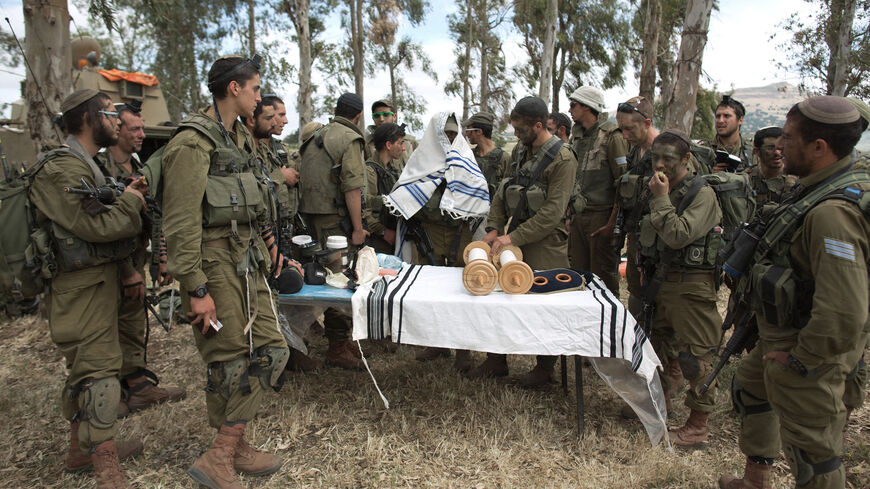According to reports over the weekend, US Secretary of State Antony Blinken will soon announce sanctions against the Netzah Yehuda Battalion, an Israeli army unit believed to be involved in human rights violations.
The expected sanctions, first reported by Axios, would mark an unprecedented move by the US government against the Israel Defense Forces. ProPublica reported last Wednesday that several months ago, a US State Department panel that investigated alleged violations of human rights in the West Bank recommended some Israeli military and police units be sanctioned.
Asked about the issue Friday, Blinken confirmed that the State Department was conducting investigations under the Leahy law that prohibits sending military aid to foreign security units found to have violated human rights. Blinken said, "I think it's fair to say that you'll see results very soon. I've made determinations; you can expect to see them in the days ahead."
Israeli Prime Minister Benjamin Netanyahu and members of his cabinet protested the news.
“In recent weeks, I have been working against the imposition of sanctions on Israeli citizens, including in my conversations with senior American government officials," Netanyahu posted on X Saturday.
War cabinet member Benny Gantz stated on Saturday, "The Netzah Yehuda battalion is an inseparable part of the Israel Defense Forces. It is subject to military law and is responsible for operating in full compliance with international law." He added, "I have great appreciation for our American friends, but the decision to impose sanctions on an IDF unit and its soldiers sets a dangerous precedent and conveys the wrong message to our shared enemies during wartime."
Gantz's office said he discussed the issue with Blinken and asked him to reconsider the reported sanctions plans.
A statement issued by the office of Defense Minister Yoav Gallant on Sunday read that he expects Washington to back down and warned that reported sanctions plans would set a “dangerous” precedent.
Gallant’s office said Sunday that he spoke with US Ambassador to Israel Jack Lew and will speak with Secretary of State Blinken shortly.
Ultra-Orthodox and extremist settlers
Netzah Yehuda is one of the four battalions that make up the Kfir infantry brigade. The battalion has operated mostly in the occupied West Bank and was sent to fight in the Gaza Strip after Oct. 7.
Netzah Yehuda was founded in 1999 to facilitate ultra-Orthodox army service. The IDF does not publish numbers, but a battalion is usually composed of 700 to 1,000 soldiers. Many secular Israelis saw the establishment of Netzah Yehuda as a positive step toward integrating the ultra-Orthodox in the military.
Serving in the army is obligatory in Israel for both men and women, but legislation permits ultra-Orthodox Israelis who study in rabbinical schools to avoid conscription. The exemption of the ultra-Orthodox from military service has long been a major issue of disagreement in Israel. As such, it is high on the agenda of the ultra-Orthodox parties, which strive to protect young citizens from leaving Torah study and being exposed to secular lifestyles.
A majority of ultra-Orthodox leaders opposed the establishment of the special battalion, but several rabbis are involved in it to ensure that the soldiers enjoy conditions that preserve their traditional way of life. For this reason, it is the only IDF battalion with no women. Many ultra-Orthodox leaders have since tacitly accepted the battalion, which offers the soldiers two years of army service and a third year of study, in which they complete high school and get professional training. All other Israeli men are required to serve three years in the military.
According to IDF data, some 1,200 ultra-Orthodox are conscripted annually. Many but not all of them serve in Netzah Yehuda. As the number of ultra-Orthodox service members has not increased substantially enough to fill Netzah Yehuda's ranks, the IDF has assigned other soldiers to the battalion as well.
They have included nationalist religious men as well as extremist settlers known colloquially as the Hilltop Youth, who are difficult to integrate into other battalions. The Hilltop Youth, many of whom have left their religious institutions and display antisocial behaviors, live in small communities in illegal West Bank outposts and have violently confronted Palestinians and damaged their property. It is unclear how many of them have entered military service over the years. In February, the United States Great Britain and France announced sanctions against extremist settlers including Hilltop Youth members.
Violence against Palestinians
The battalion has been at the center of several incidents of right-wing extremism and violence against Palestinians.
The most infamous took place in January 2022, when Palestinian-American Omar As’ad, 78, died after being detained, handcuffed, blindfolded and later abandoned in near-freezing conditions by Netzah Yehuda soldiers. As'ad's death prompted international uproar and Washington demanded an investigation after a preliminary inquiry found that the soldiers falsely claimed they were instructed to handcuff him. The IDF admitted wrongdoing and sanctioned the three commanders of the unit, but no soldiers were charged over the affair.
After that incident, the State Department instructed its embassy in Israel to start documenting the behavior of the battalion and to investigate whether human rights violations were being committed. Embassy staff interviewed Israelis and Palestinians including nongovernmental organization workers in the West Bank.
Apart from this instance, soldiers of the battalion have been suspended and reprimanded on at least two occasions — in 2019 and in 2022 — for beating and otherwise mistreating Palestinians.
Sanctions follow sanctions
Last Friday, the European Union and the Biden administration announced a series of sanctions against far-right Israeli activists and groups involved in violence against West Bank Palestinians. They include the Jewish supremacist organization Lahava and its founder Benzi Gopstein, who is considered a close associate of National Security Minister Itamar Ben-Gvir. Ben-Gvir has served as Gopstein's lawyer and according to Haaretz, Gopstein has been serving as an informal adviser to Ben-Gvir since his appointment as minister in 2022.
If the United States does sanction Netzah Yehuda, the battalion would no longer be allowed to use American ammunition or American-manufactured vehicles. Its soldiers would also be prevented from training with American troops or taking part in any program financed by American funding.



